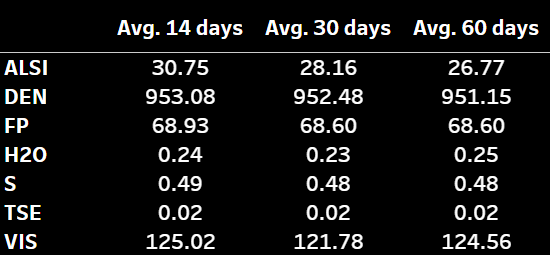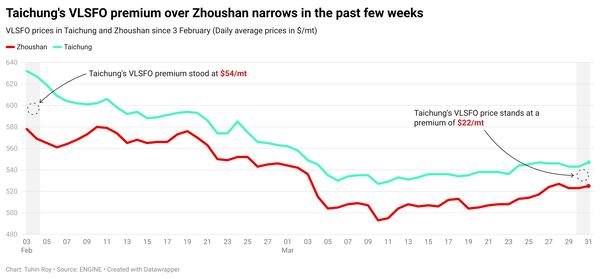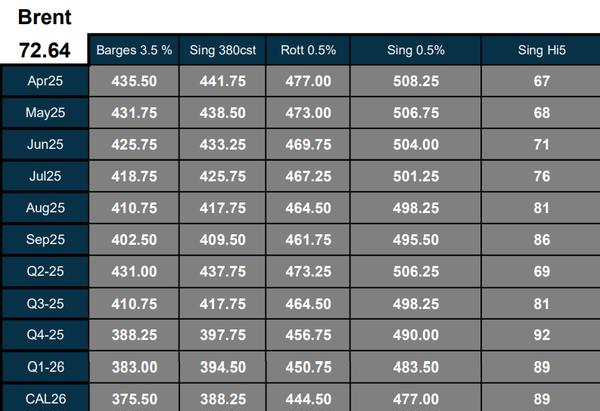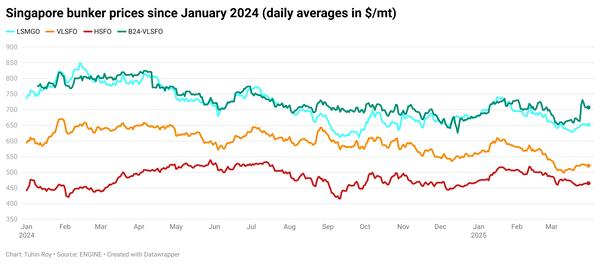The Week in Alt Fuels: Ambition doesn’t pay the bill
The shipping industry warns that high price tags could stymie adoption of green marine fuels.
 PHOTO: Getty Images
PHOTO: Getty Images
As the shipping industry explores alternatives to fossil fuels, cargo owners and multiple shipping trade bodies are sounding the alarm on a pressing issue: as green fuels are just too expensive and without financial support, the transition may stall before it truly begins.
Eye-wateringly expensive
The World Shipping Council (WSC) recently put hard numbers to this challenge. In its latest report, it laid out a stark price comparison between low-emission and conventional marine fuels.
Bio-methanol in Europe could cost around $2,276/mt on a VLSFO-equivalent basis, according to various prices that WSC has sourced. E-methanol is estimated to come in at a whopping $3,034/mt.
That makes bio-methanol roughly 469% more expensive than VLSFO, and e-methanol an eye-watering 626% more expensive.
The pattern continues across other alternative fuels. Bio-methane is projected at $1,208/mt, or 169% over the price of fossil LNG. Green ammonia could come in at $2,037/mt, roughly 285% over fossil LNG.
And the most expensive of the lot? E-methane, which could hit $4,000/mt, or about 560% more than fossil LNG.
“These cost differentials suggest that, at current market rates, renewable marine fuels are not yet commercially viable,” the WSC said.
A chorus of trade bodies and a cargo owners’ alliance echoes this view.
Scale rather than short-termism
The Global Maritime Forum has outlined several proposals for the IMO. These include early support for e-fuels to avoid costly technology lock-ins for LNG and other so-called transition fuels, a global levy on greenhouse gas (GHG) emissions with targeted revenue redistribution and regulatory certainty to attract investment.
ZEMBA, representing cargo owners, has urged the IMO to provide financial support to scale up green fuel production. Without it, shipping companies may default to “unsustainable short-term options,” which could undermine market confidence and slow the transition, its chief executive Ingrid Irigoyen said.
Well-structured incentives could help build a viable market for scalable low-emission technologies, Irigoyen noted.
“All change comes with risk, but ambitious IMO policies would provide the certainty as to the future fuel mix that investors are looking for to ramp up development," Opportunity Green’s chief executive, Aoife O'Leary, told ENGINE. "Robust regulation would drive suppliers and shipowners towards the green hydrogen fuels with the least emissions, while rewarding those that move first and furthest,” she added.
Danish Shipping is pushing for proactive policies at the regional level. It argues that while Danish shipowners are ready to invest in low-emission vessels, the fuels to power them are not available at scale, and the funding available today is “insufficient” to change that.
The trade body proposed a suite of financial mechanisms, including the use of revenue from the EU Emissions Trading System (EU ETS) to directly support green fuel production. It also recommends double-sided auctions to balance price gaps between fuel producers and off-takers, drawing from models like Germany’s H2Global initiative.
Charging for sustainability
And that seems to be the heart of the problem. Some shipping companies have already started offering low-emission shipping options to customers, but these services typically come at premiums over regular charges.
For instance, cargo owners can claim up to 65% CO2-equivalent emissions reductions by using X-Press Feeders’ green methanol-powered vessel on its Rotterdam–Baltic route if they pay a premium that “equates to 2.5 Euro cents for each pair of shoes.”
“Green methanol is costlier than conventional marine fuel,” the company explains. “We all have to pay a price to be sustainable, but we believe this is a small price to pay.”
Other carriers such, as A.P. Moller-Maersk, Hapag-Lloyd and Mediterranean Shipping Company, offer carbon savings through insetting schemes based on the book-and-claim model. This allows customers to claim emissions reductions by paying a premium, even if their specific cargo isn’t shipped using alternative fuels.
Bigger cargo owners might accept the trade-off, but the smaller ones may be more hesitant.
This could make it harder for smaller shipping companies that lack the scale, bargaining power and contractual flexibility of larger players, to pass on green fuel costs and compete in a market where margins are already thin. As a result, even willing players may find themselves constrained by economics.
Calling for regulatory backup
The shipping industry has the technology for a green marine fuel transition, but urgent regulatory support is needed to promote fuels that reduce ships' GHG emissions, said Karsten Kildahl, chief commercial officer at Maersk.
And this regulatory support could come from the IMO, regional funds or national subsidies. But without it, the industry risks falling back on short-term savings at the expense of long-term progress.
In other news this week, Portuguese biofuel producer PRIO Energy has started supplying B100 (100% biofuel) in Portugal and expects biofuel bunker demand to pick up pace. The B100 biofuel is produced at PRIO’s biodiesel plant in Aveiro, within the Port of Aveiro.
The Maritime and Port Authority of Singapore (MPA) has opened up applications for licenses to supply methanol as a marine fuel in Singapore. This comes after Singapore devised a methanol bunker licensing framework and standard, and on the back of several methanol bunker trials in the port since 2023.
A consortium of Japanese firms and Indian renewables firm ACME plan to set up a 400,000 mt/yr of green ammonia production facility in the Indian state of Odisha by 2030. They have not specified whether the produced ammonia will be allocated to bunkering, but shipping firm Mitsui O.S.K. Lines (MOL) is in the consortium and has hinted at the possibility.
By Konica Bhatt
Please get in touch with comments or additional info to news@engine.online

Contact our Experts
With 50+ traders in 12 offices around the world, our team is available 24/7 to support you in your energy procurement needs.




